Key takeaways:
- Border security training emphasizes the importance of collaboration and communication among agencies to effectively respond to threats.
- Real-world applications of training reveal how skills in crisis management and community engagement can enhance border security efforts.
- Attention to detail and a mindset geared towards vigilance are critical in navigating the complexities of border security operations.
- Personal development through training fosters adaptability, emotional intelligence, and a commitment to lifelong learning in the field.
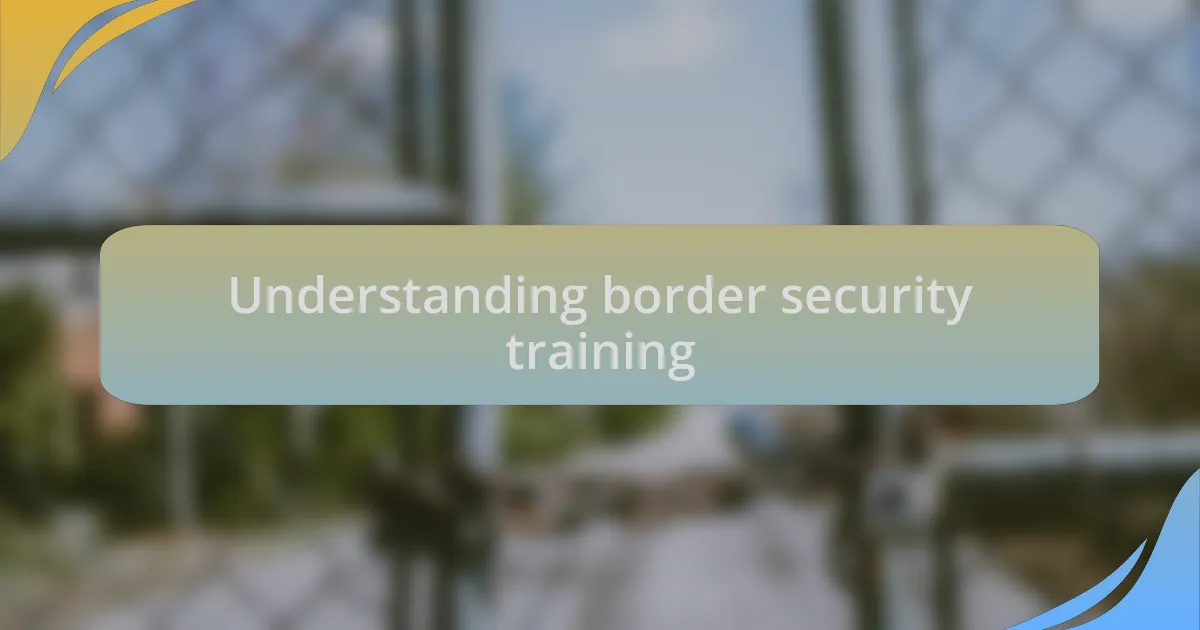
Understanding border security training
Border security training encompasses a range of skills and knowledge essential for ensuring the safety and integrity of a nation’s borders. I vividly remember my first day of training—I was flooded with a mix of excitement and apprehension about the responsibility ahead. How could I protect such a vast and diverse area? This initial feeling underscored the profound nature of the work we were preparing to undertake.
During the training, I found myself deeply engaged with topics like threat identification and risk assessment. It’s fascinating how even subtle changes in behavior can indicate something far more significant. Reflecting on this, I often ask myself: how well can we really read these signs? Understanding the nuances of human behavior became an invaluable lesson, reminding me that effective border security goes beyond protocols; it’s about intuition and awareness.
Moreover, I appreciated the emphasis on collaboration among various agencies. I recall participating in simulated scenarios where teamwork was critical. Those experiences highlighted that successful border security relies not just on individual skills, but on how well we work together. Aren’t we stronger when we unite our efforts? This training solidified my belief in the importance of communication and cohesion in achieving our common goals in border security.
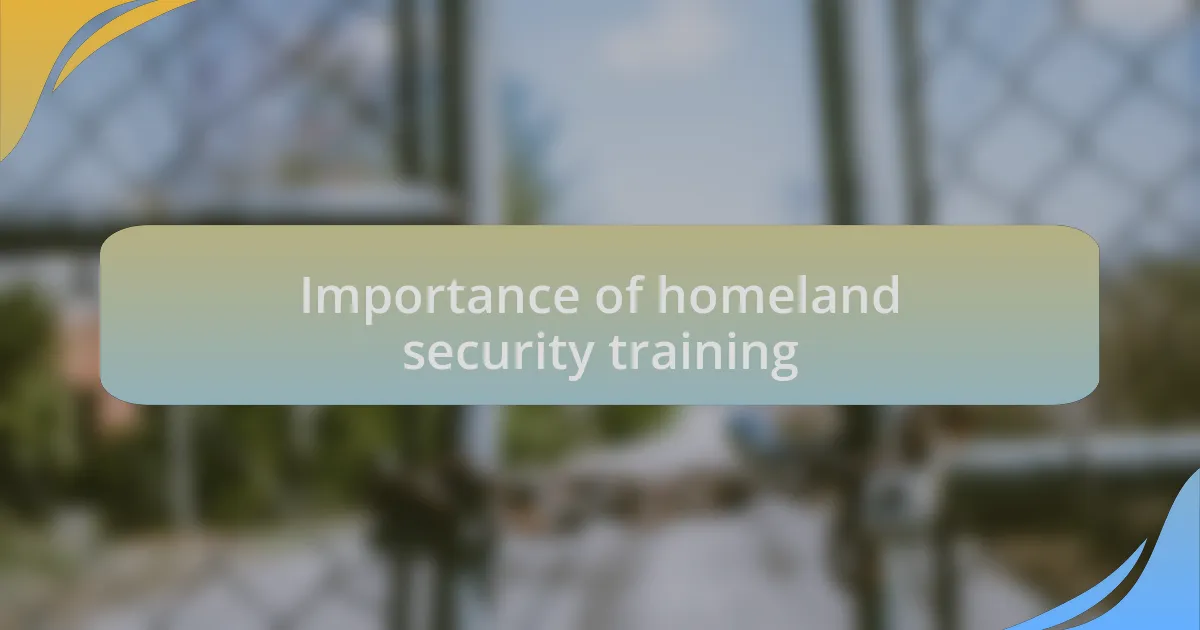
Importance of homeland security training
Understanding the importance of homeland security training is crucial for anyone involved in safeguarding our nation. I remember one specific exercise where we had to identify potential threats in real-time. The adrenaline rush was palpable, and it hit me how quickly decisions must be made in real-life situations. This experience deeply reinforced my understanding that training isn’t just theoretical; it prepares us for the unexpected challenges we might face daily.
I often reflect on the range of skills that it encompasses. It’s not merely about learning policies and procedures; it’s about developing a mindset geared towards vigilance and proactive measures. During a particularly intense session, I felt a shift in my perspective—this was about more than just following rules; it was about nurturing a protective instinct for my community. Isn’t it remarkable how training can transform our outlook, making us not just agents of security but guardians of our way of life?
Collaboration is another vital aspect that stands out in my mind. I can recall a moment when different agencies came together to tackle a simulated crisis. The synergy among us was invigorating; we were all focused on a common goal. It really drove home the point that homeland security isn’t a solitary endeavor. How could we effectively protect our borders without that unity? Through these experiences, I recognized that the strength of our training lies in the relationships we build—it’s about trust, communication, and shared responsibility.
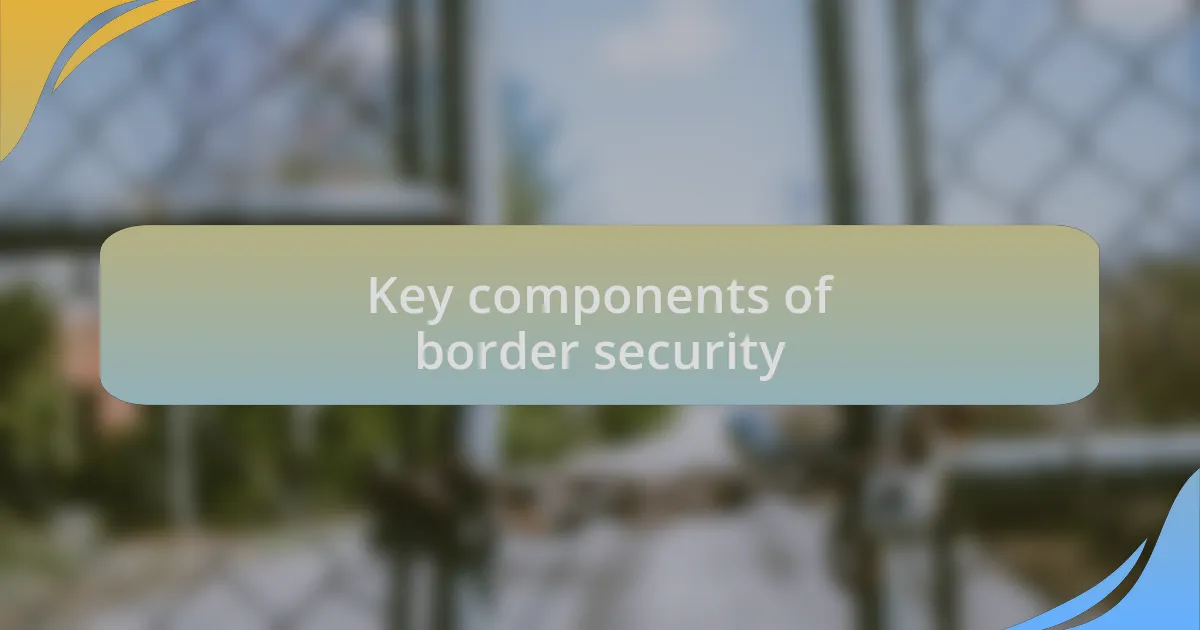
Key components of border security
Key components of border security encompass a range of strategies designed to protect our nation’s borders effectively. One of the most significant aspects I’ve learned is the importance of surveillance technology. I remember the first time I encountered the advanced drones and sensors in training; the sheer capability to monitor vast areas in real-time was both exhilarating and humbling. It made me realize how crucial these tools are in deterring illegal crossings and swiftly responding to potential threats.
Another vital component is the human factor—border patrol agents and their extensive training play a pivotal role. During my training, I had a mentor who shared experiences from the field, emphasizing the importance of critical thinking and quick decision-making. Hearing about those tense moments when lives were at stake truly resonated with me. How do we prepare ourselves to handle such pressure? It’s in these interactions and stories that the nuances of the job come to life, reminding us that while technology is important, the human touch is irreplaceable.
Furthermore, collaboration among various agencies is foundational to effective border security. I vividly recall a joint exercise with local law enforcement, where we practiced responses to a simulated smuggling operation. The coordination required was intense, but it was inspiring to see how our efforts combined into a seamless strategy. How powerful is it when multiple entities work towards a shared purpose? That experience underscored that success in border security isn’t just about one entity acting alone; it’s about a network working together, adapting and responding as a cohesive unit.
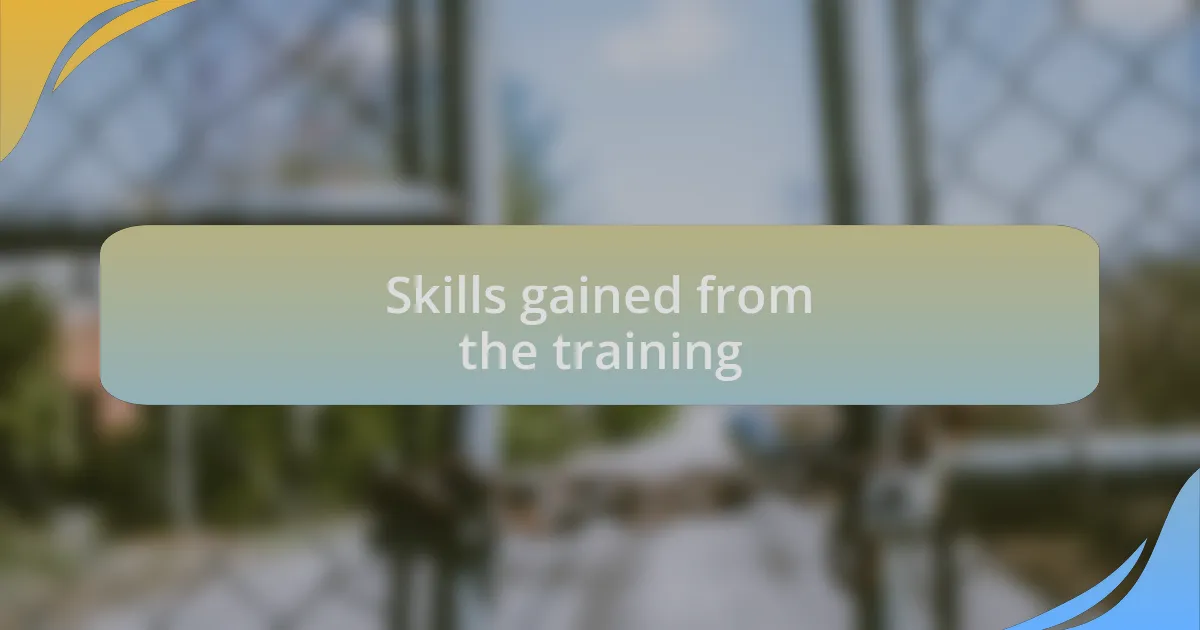
Skills gained from the training
The training equipped me with practical skills that extend far beyond just understanding procedures. For instance, during a simulation exercise, I learned how to assess risk factors effectively under pressure. I still remember the rush of adrenaline when I had to make split-second decisions in a mock scenario, weighing the safety of my team against potential threats. Did I ever think I could handle that kind of intensity? Surprisingly, I discovered a level of focus I hadn’t realized I possessed.
Communication also emerged as a key skill throughout the training. Engaging with various departments highlighted the necessity of clear and concise dialogue in high-stakes situations. I found myself facilitating discussions among trainees from diverse backgrounds, bridging gaps, and ensuring everyone was on the same page. How often do we underestimate the power of effective communication in teamwork? In those moments, I learned that a single miscommunication could lead to significant consequences, underscoring the need for clarity.
On a more technical note, I became proficient in various surveillance tools and software. My hands-on experience with these technologies was enlightening. For instance, during a series of workshops, I focused on drone operation and interpreted data that helped enhance situational awareness. It was fascinating to see how these tools transformed raw data into actionable intelligence. How amazing is it that technology can significantly bolster our capabilities? Gaining these skills felt not only empowering but also essential for contributing to the safety of our borders.
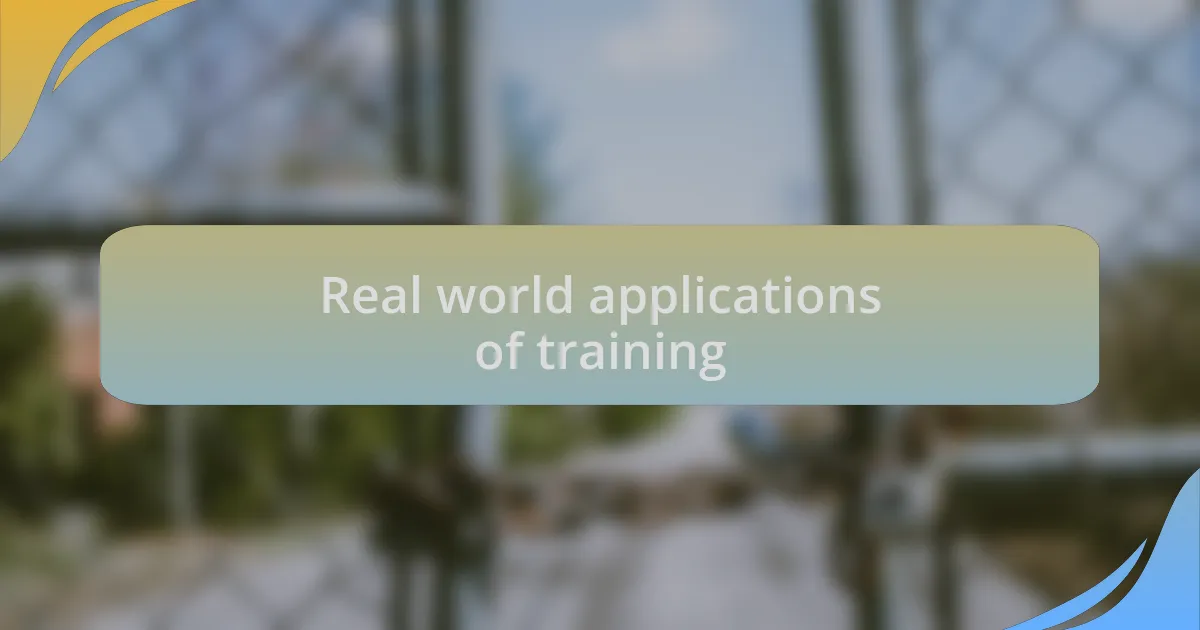
Real world applications of training
One of the most powerful applications of my training came when I participated in a joint exercise with local law enforcement agencies. The scenario involved managing a simulated border crisis, and my role required me to enact protocol while coordinating with officers from different jurisdictions. I could feel the tension mount as we worked together seamlessly, and I realized that the connections forged during training were not just theoretical; they were about building trust and efficient teamwork in real-life situations. Have you ever felt the weight of responsibility in a team? That day, I truly understood how vital it is to rely on one another during high-pressure events.
Another real-world application emerged during a community outreach program aimed at raising awareness about border security issues. Engaging with the public allowed me to employ my communication skills in a way I hadn’t anticipated. I recall an elderly gentleman expressing his concerns about safety and feeling unheard in the past. Addressing his questions with clarity and empathy not only eased his worries but also reinforced the idea that effective dialogue goes beyond procedures. Isn’t it incredible how just a conversation can shift perspectives? This experience highlighted for me the importance of community involvement in security efforts, bridging the gap between agencies and citizens.
On a more tactical level, I applied my training insights during a collaboration on a major border security initiative. Analyzing data from surveillance tools revealed patterns and trends that we could act upon. I remember one instance where interpreting drone footage led to the identification of unauthorized crossings that could have gone unnoticed. The satisfaction of connecting my training to a successful operation was palpable. Have you ever had a moment where you realized your actions directly contributed to a larger goal? For me, it was a reaffirmation that the skills gained through training had profound implications in protecting our communities.
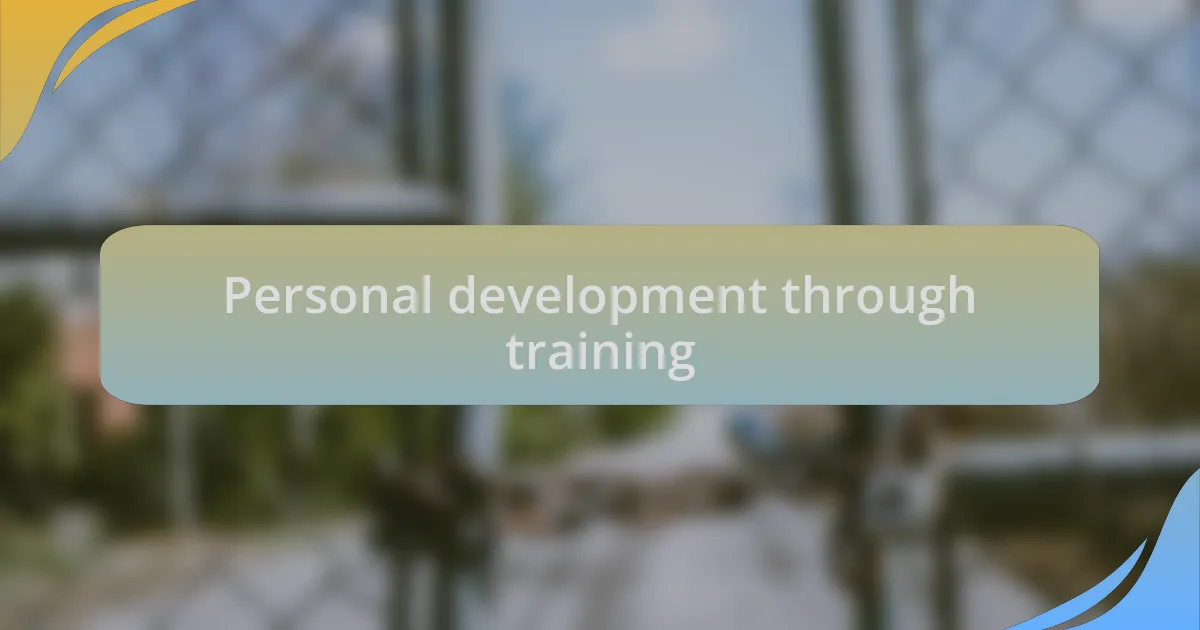
Personal development through training
Personal development through training fundamentally reshaped my understanding of both my capabilities and my role within a team. I remember sitting through a particularly challenging session on conflict resolution; the dynamics of the role plays were intense. By navigating difficult dialogues, I began to appreciate the nuances of communication—an insight that directly influenced my confidence in high-stress scenarios. Have you ever walked away from a workshop feeling like you just leveled up in life? That was me.
One specific moment struck me during a simulation designed to teach crisis management. I played the part of a mediator between conflicting parties, and the emotional intensity was palpable. As I worked to de-escalate tensions and seek common ground, I realized I was not only honing my negotiation skills but also learning to manage my emotions under pressure. This experience taught me the importance of emotional intelligence in border security—I mean, how else do you effectively diffuse a crisis if you don’t understand the feelings of those involved?
In addition to technical skills, the training emphasized the importance of adaptability. I recall an exercise where we had to shift strategies mid-scenario based on unexpected developments. That experience pushed me beyond my comfort zone, prompting me to embrace flexibility as a critical component of effective border security operations. It made me ask myself, how well do I adapt to change? For me, it was a revelatory moment that encouraged a mindset shift—training wasn’t just about learning protocols; it was about cultivating readiness for anything that might arise.
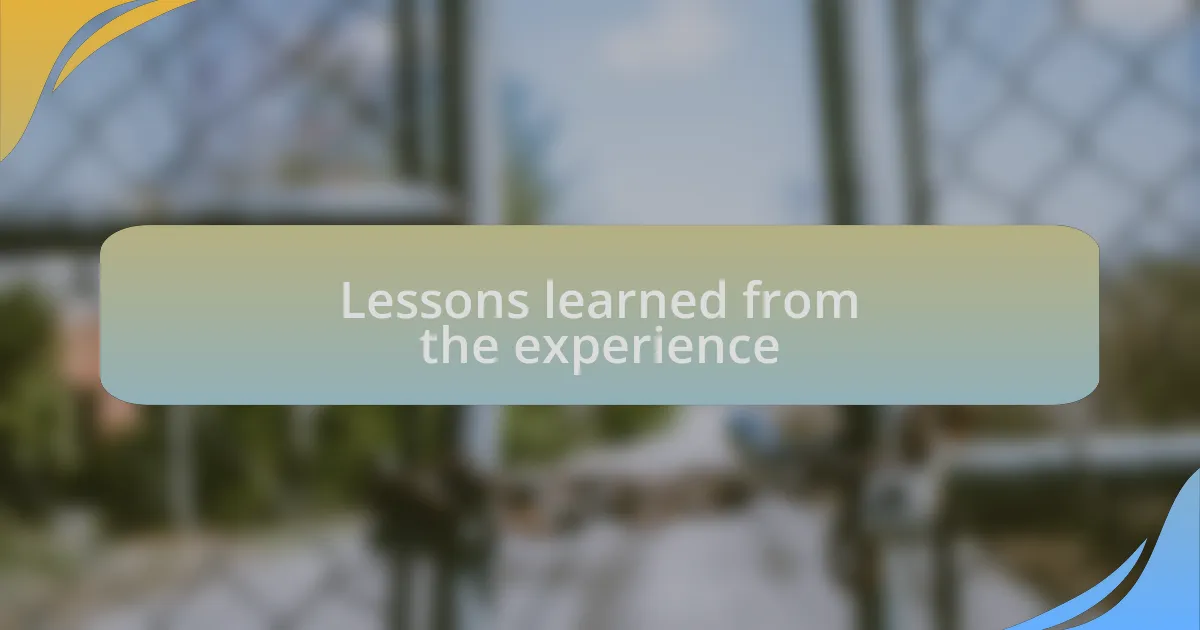
Lessons learned from the experience
During the training, I found that teamwork is essential in high-pressure environments. One memorable exercise had us collaborate under time constraints to analyze and respond to a simulated border breach. The camaraderie we developed during those intense moments was eye-opening. How often do we underestimate the power of collective problem-solving? I learned that when individuals come together with diverse perspectives, the results can be truly transformative.
The importance of attention to detail really hit home for me during a session focused on surveillance techniques. We reviewed real-life scenarios where minor oversights had significant consequences. I vividly recall my initial dismissal of seemingly trivial clues that turned out to be critical. Reflecting on this, I now realize how crucial it is to remain vigilant and thorough in every task, no matter how small it appears. Have you ever caught yourself overlooking something you later realized was vital? That experience heightened my awareness of the intricate web of information that can influence security outcomes.
Lastly, I discovered the value of continual learning. A few weeks into the training, I overheard a senior officer share how he consistently updates his skills to keep pace with evolving threats. It made me think—how committed am I to my own development? This sparked a passion for ongoing education in me; I recognized that staying informed and adaptable is not just beneficial but essential. That commitment to lifelong learning reshapes how I approach my role in border security, inspiring me to continually refine my abilities and deepen my understanding.